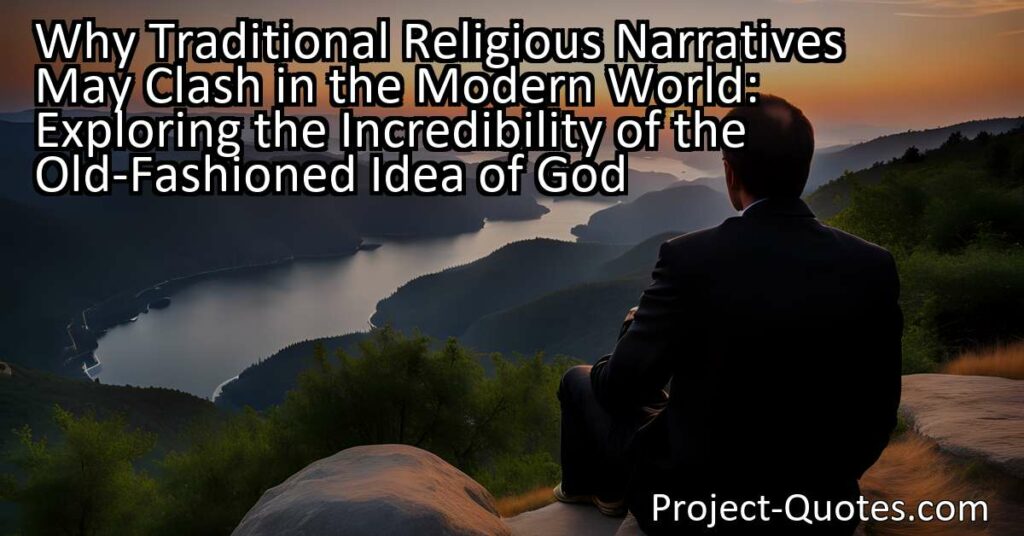The difficulty for most of us in the modern world is that the old-fashioned idea of God has become incredible or implausible.
Alan Watts
Discover why traditional religious narratives may clash with the modern world. Factors such as scientific advancements, the decline of religious influence, exposure to different beliefs, and the problem of evil have all contributed to the incredibility of the old-fashioned idea of God. However, alternative perspectives offered by philosopher Alan Watts, such as pantheism and finding the divine within oneself, provide avenues for individuals to explore spirituality outside of traditional religious dogmas.
Table of Contents
- 1 The difficulty for most of us in the modern world is that the old-fashioned idea of God has become incredible or implausible.
- 2 Alan Watts
- 3 Meaning of Quote – The difficulty for most of us in the modern world is that the old-fashioned idea of God has become incredible or implausible.
- 4 Freely Shareable Quote Image
- 5 Related
Meaning of Quote – The difficulty for most of us in the modern world is that the old-fashioned idea of God has become incredible or implausible.
In today’s fast-paced and ever-changing world, it’s not uncommon for people to feel disconnected from spirituality and struggle with the concept of God. Many of us find the traditional notion of a higher power increasingly difficult to believe in or find plausible. Alan Watts, a philosopher and writer who delved into topics such as religion, spirituality, and the human experience, expresses this sentiment with the quote, “The difficulty for most of us in the modern world is that the old-fashioned idea of God has become incredible or implausible.”
To fully understand this quote, we need to explore the reasons why the traditional idea of God may seem unbelievable in contemporary times. One of the major factors contributing to this shift is the advancement of science and technology. As we uncover the mysteries of the universe through scientific exploration, traditional religious narratives may clash with the evidence-based explanations provided by science. This clash often raises questions and doubts in the minds of individuals seeking a logical understanding of the world around them.
Moreover, the rise of secularism and the decline of religious influence in many societies have led to a decrease in religious affiliations and practices. As people increasingly turn to secular ideologies, the idea of an all-knowing, all-powerful deity can seem outdated and incompatible with their worldview. Additionally, the prevalence of differing religious beliefs and the exposure to different cultures and traditions further challenges the conventional concept of God, as it becomes apparent that countless interpretations and versions of God exist.
Another reason why the traditional idea of God may appear implausible in the modern world is the problem of evil. The existence of immense suffering and injustice in the world raises the question of how an all-loving, all-powerful God could allow such atrocities to occur. This age-old conundrum has deeply troubled many individuals, leading them to question the validity of the traditional idea of God. If God is meant to be benevolent and omnipotent, why is there so much pain and suffering in the world?
Furthermore, the emergence of critical thinking has also played a significant role in challenging traditional religious beliefs. As individuals become more educated and exposed to a variety of ideas and perspectives, they develop a natural inclination to question and analyze the concepts presented to them. This inclination for critical examination extends to the notion of God, as people begin to seek rational justifications for their beliefs. They desire coherent explanations that align with their growing understanding of the world, rather than accepting ideas blindly.
However, just because the traditional idea of God has become incredible or implausible to many does not mean that spirituality or the experience of the divine has lost all relevance and meaning. In fact, Watts himself explored various alternative perspectives on spirituality that might resonate with those struggling to connect with the conventional idea of God.
For example, Watts proposed the concept of pantheism, which suggests that the divine exists within the fabric of the universe itself. In this view, God is not a separate entity but is instead intricately fused with all the natural phenomena and life forms we encounter. Pantheism encourages individuals to find divinity in every moment and every aspect of existence, transcending the need for a traditional deity. This perspective allows one to connect with the sacredness of life without subscribing to a specific religious dogma.
Watts also delved into the idea of “the God within.” He believed that each individual possesses an intrinsic divinity, a spark of the divine that permeates their being. According to this view, the purpose of spirituality is not to seek an external God but to awaken and cultivate the divine potential within oneself. By exploring inward, individuals can tap into their own innate wisdom, find a sense of transcendence, and lead a fulfilling and meaningful life.
Moreover, Watts emphasized the importance of direct experience and personal revelation when it comes to matters of spirituality. He encouraged individuals to explore different practices and traditions, seeking whatever resonates with their inner truth. By engaging in personal exploration and reflection, one can discover their own unique spiritual path, unbound by the limitations of traditional religious dogmas.
In conclusion, Alan Watts’ quote highlights the challenge many face in reconciling the old-fashioned idea of God with the modern world. The remarkable advancements in science, the decline of religious influence, the problem of evil, and the promotion of critical thinking have all contributed to the increasing incredibility or implausibility of traditional religious beliefs. However, it is important to acknowledge that spirituality and the experience of the divine extend beyond the confines of conventional religion. Watts offered alternative perspectives such as pantheism and the concept of the God within, inviting individuals to explore their own spiritual truths. By embracing personal revelation, direct experience, and an open mind, one can forge a meaningful connection with the transcendent, even in the face of the incredibility of the old-fashioned idea of God.
I hope this quote inspired image brings you hope and peace. Share it with someone who needs it today!


